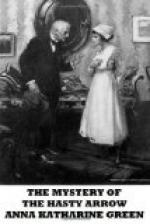“That was occasioned by my anxiety for her—an anxiety which seems to have been only too well-founded.”
“How? What?” Both of the officials showed a greatly increased interest. “Please explain yourself, Mr. Travis. What reason had you for any such feeling in regard to a person with whom you had held no conversation? Anything which you saw or heard at the hotel?”
“Yes. I was sitting in the foyer. I knew that the ladies were in the house, but I had not seen them. I was anxious to do so (see, I am telling all) and was watching the door of the lift from behind my journal, when they both stepped out. Miss Willetts was dressed for the street, but Madame Duclos was not, which seemed very strange to me. But I felt no concern till I caught some fragments of what Madame said in passing me. She spoke in French, a language I understand, and she was exclaiming over her misfortune at not being allowed to accompany her young charge to whatever place she was going. It was bad, bad, she cried, and she would not have a moment’s peace till her dear Angeline got back. Anxiety of this kind was natural in a Frenchwoman not accustomed to see a young lady enter the streets alone; but the force with which she expressed it betrayed a real alarm—an alarm which communicated itself to me. Where could this unprotected girl be going, alone and in a hotel cab?
“I could not imagine, and when I saw Madame stop in the middle of her talk to buy some fresh flowers and pin them to Miss Willetts’ corsage, I got a queer feeling, and flinging my newspaper aside, I strolled to the door and so out in time to hear Madame’s orders to the chauffeur. The young lady was to be taken to a museum. To a museum, at this early hour! and alone, alone! Such a proceeding is not at all in accord with French ideas, and I feared a plot. Though it was far from being my affair, I determined to make it so; and as soon as I dared, I followed her just as I had followed her from the dock. But fruitlessly! Not knowing the danger, how could I avert it? I was in one gallery, she in the other. It was my evil fate to see her fall, but by whose hand I am as ignorant as yourselves. Now I have told it all. Will you let me go?”
“Not yet,” interposed the Coroner. “There are one or two questions more which you will undoubtedly answer with the same frankness. Were you standing in front of the pedestal or behind it when you saw Miss Willetts fall?”
“I was standing just where I said, somewhere near it in the open gallery.”
This seemed so open to question that the Coroner paused a moment to recall the exact situation and see if it were possible for a man as conspicuous in figure as Mr. Travis to have stood thus in full view of gallery and court, without attracting the attention of anyone in either place. He found, after a moment’s consideration, that it was possible. Mr. Gryce, for all his efforts and systematic inquiry into the position which each person had held at or near this time, had been able to find but one who chanced to be looking in the direction of this gallery, and he with a limited view which took in only the upper part of the tapestry.




